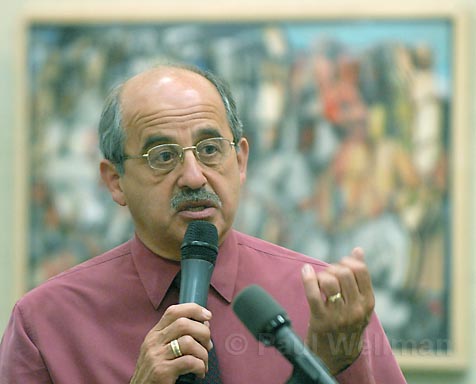SBCC Cancels Adult Ed Housing Series
Too Hot for Words

Santa Barbara City College officials pulled the plug on an Adult Education series focusing on growth and urban planning scheduled to begin this January the day after the series had been hammered in the first of two Santa Barbara News-Press editorials as unbalanced. “I was not shocked, but I was very disappointed,” said Pat Saley, who would have moderated the six-week program, titled Common Ground. The series was designed to explore the extent to which South Coast developers, environmentalists, and affordable housing activists could agree on the area’s future. City College President John Romo said it was an “unfortunate coincidence” the series was cancelled the day the editorial ran. “We’re not afraid of controversy; we’ve been through controversy. I know controversy,” he said, adding that he dispatched SBCC Vice President Pablo Buckelew to look into the allegations leveled in the October 15 editorial. Buckelew, Romo relayed, concluded that the program was not sufficiently balanced to meet the standards required of Adult Ed curricula. “These are all good people, but they have an agenda,” Romo said. “And their panelists appeared to us to advance that agenda”-that agenda being to limit new development to urban in-fill rather than allowing sprawl. “There was no one on the panel with a different perspective,” Romo said.
Common Ground organizer Saley said she’d secured several prominent slow-growthers and neighborhood activists to sit on the panel discussions. She added that she’d invited two of the most outspoken on the South Coast-Gary Earle and Judith Ishkanian of the Homeowners Defense Fund-to participate in the panels, but they had declined. “This was so skewed that I wasn’t going to legitimize it by putting my name on it,” Earle said, noting that he would have been the only slow-growther on a panel of four. Romo said he was not aware that these two had been invited. But it was too late, he said, because the deadline for publishing the winter’s Adult Ed schedule was last Wednesday, and there was no more time to juggle the speakers’ roster.
Common Ground supporters say they’re infuriated and crushed, as they thought they’d achieved a significant breakthrough on critical public policy issues perpetually hamstrung by sterile posturing and reflexive confrontation. They find especially galling that it was squelched by an academic institution at the apparent instigation of the News-Press. Common Ground started last year after the defeat of Measure D, the sales tax surcharge proposed to fund a variety of road improvement and transportation projects. Believing that transportation could not be looked at in isolation, 1st District Supervisor Salud Carbajal gathered developers, old-school slow-growth environmentalists, new urbanists, save-the-coast tree-huggers, good-government types, and affordable housing advocates. After monthly meetings, the group agreed that housing, open space, and transportation (HOT) should be regarded as integral parts of the same package.
Notably missing from Common Ground’s stakeholder group, however, were any hardcore neighborhood activists who sue to raise hell about any projects proposed near their homes. Even so, Saley said, there were spirited disagreements-and compromises-between developers and environmentalists. Once they reached consensus, the group wanted to take their show on the road in the form of an Adult Ed series. The featured speakers were to include housing specialists, the sociologist who co-authored Santa Barbara’s ’70s slow-growth manifesto Limits to Growth, and developer Mike Towbes.
City College’s announcement jettisoning the series may have come as a shock, but it was not the first time that campus officials had expressed their concern that speaker panels might represent too narrow a spectrum. Saley, however, thought she had addressed those concerns. The fallout from the cancelled series could be felt at all levels of government. Santa Barbara City Councilmember Grant House-while discussing an entirely different matter on the council dais-spontaneously expressed both his disappointment and anger over the cancelled series. “It just makes my blood boil,” House said. “It really upsets me.”



